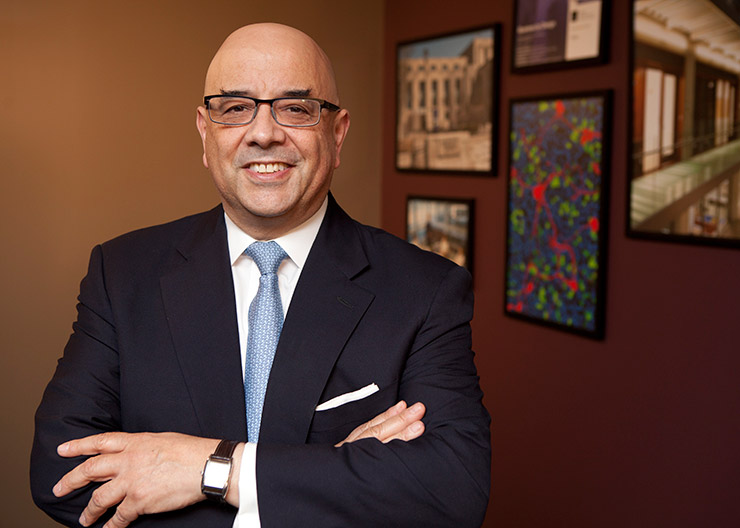Julio M. Ottino, dean of the McCormick School of Engineering at Northwestern University, has been awarded a prestigious national education prize for the development and implementation of Whole-Brain Engineering, the school’s principal guiding strategy for more than a decade.
The 2017 Bernard M. Gordon Prize for Innovation in Engineering and Technology Education from the National Academy of Engineering (NAE) honors Ottino and his innovative education efforts that have swept across both the McCormick School and the University.
Whole-Brain Engineering is a reimagining of engineering education; it merges the analytical and technical components of engineering (left brain) with creativity, design and divergent thinking (right brain). This interdisciplinary approach for developing leaders has led to new Northwestern programs and initiatives for engineers and non-engineers alike and has attracted the attention of other engineering schools worldwide.
“Julio’s leadership and vision have helped form a new culture of collaboration at McCormick with far-reaching effects across the University and beyond,” Northwestern President Morton Schapiro said.
“He has made engineering central to numerous initiatives across the University’s disciplines -- music, journalism, social sciences and law -- and led collaborative partnerships with premier institutions, including the School of the Art Institute of Chicago and the Rehabilitation Institution of Chicago,” President Schapiro said.
The Gordon Prize is the highest honor in the country for engineering education. Ottino will be honored at the NAE’s Gordon Prize ceremony May 30 at Northwestern. He will split the $500,000 prize money equally with the McCormick School.
“I am pleased to recognize Julio Ottino for his transformational program at Northwestern University,” NAE President C. D. Mote Jr. said. “Julio is the personification of a leader who is preparing the next generation of engineers to tackle society’s greatest challenges.”
“It is an incredible honor to be recognized on behalf of the outstanding faculty and staff at McCormick for the work that we have done,” said Ottino, who, as both an engineer and an artist, exemplifies whole-brain thinking. “From the beginning, we set out to reframe engineering, emphasizing that engineers should be thought of by how they think, not just by the things that they make. Northwestern has been an ideal environment to build interdisciplinary partnerships that helped put this vision into action.”
Ottino and his McCormick leadership team have established three key pillars for developing whole-brain engineers skilled in problem solving: design, entrepreneurship, and leadership and personal development. These pillars underpin a wide range of programs and activities -- curricular, extra-curricular and research -- that span and connect students at both the undergraduate and graduate levels.
“Julio’s approach to engineering education mirrors the increased prevalence of engineering and technology in our everyday lives and prepares engineers to work with diverse teams and to understand the needs of the populations they serve,” President Schapiro said.
Whole-Brain Engineering and its integrated way of thinking are evident in McCormick, across the University and beyond:
- First-year students are introduced to Whole-Brain Engineering and the problem-solving process in the earliest days of their McCormick education
- Nearly every engineering student works on a project to enhance the quality of life of a Rehabilitation Institute of Chicago (RIC) patient with a disability
- NUvention, McCormick’s flagship interdisciplinary course that exposes Northwestern students to the entire innovation and entrepreneurial life cycle, has grown from one track to eight tracks, ranging from arts and analytics to transportation and therapeutics
- Design for America (DFA), a student initiative in which students practice social service through design, was founded at McCormick, and DFA studios are now at 36 college and university campuses across the country
- The Segal Design Institute and the Farley Center for Entrepreneurship and Innovation attract students from across Northwestern to their events and courses, including the Farley Center's NUvention program.
By augmenting existing programs and developing new initiatives to complement an already strong technical curriculum, McCormick provides a better student experience, prepares engineers to have a bigger impact and imagine new possibilities in solving complex problems and attracts more students into STEM fields.
McCormick has developed collaborations with other schools and programs on campus, increasing the centrality of engineering within a comprehensive university. Many new courses bring together students from across disciplines and also partner with local institutions, such as RIC and the School of the Art Institute of Chicago.
Ottino has led the development of Whole-Brain Engineering since 2005. Since making it the cornerstone of Northwestern Engineering’s strategy, the number of women in the school has increased by more than 60 percent, and engineering enrollments are at all-time high levels.
In addition to his role as dean, Ottino serves as Distinguished Robert R. McCormick Institute Professor, Walter P. Murphy Professor of Chemical and Biological Engineering and professor (by courtesy) of mechanical engineering. He is the founder and former director of the Northwestern Institute on Complex Systems (NICO).
Ottino, who has supervised more than 50 Ph.D. theses, previously held positions at the University of Massachusetts Amherst as well as chair and senior appointments at the California Institute of Technology and Stanford University. He is a member of both the National Academy of Engineering and the American Academy of Arts and Sciences.
The Gordon Prize was established in 2001 as a biennial prize acknowledging new modalities and experiments in education that develop effective engineering leaders. Recognizing the potential to spur a revolution in engineering education, NAE announced in 2003 that the prize would be awarded annually.
The NAE is part of the National Academies of Sciences, Engineering and Medicine, an independent, nonprofit organization chartered by Congress to provide objective analysis and advice to the nation on matters of science, technology and health.


